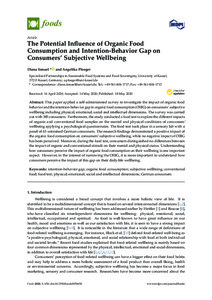| dc.date.accessioned | 2020-06-30T12:31:51Z | |
| dc.date.available | 2020-06-30T12:31:51Z | |
| dc.date.issued | 2020-05-18 | |
| dc.identifier | doi:10.17170/kobra-202006301383 | |
| dc.identifier.uri | http://hdl.handle.net/123456789/11615 | |
| dc.description.sponsorship | Gefördert durch den Publikationsfonds der Universität Kassel | |
| dc.language.iso | eng | |
| dc.rights | Namensnennung 4.0 International | * |
| dc.rights.uri | http://creativecommons.org/licenses/by/4.0/ | * |
| dc.subject | intention-behavior gap | eng |
| dc.subject | organic food consumption | eng |
| dc.subject | subjective wellbeing | eng |
| dc.subject | conventional food | eng |
| dc.subject | food test | eng |
| dc.subject | physical | eng |
| dc.subject | emotional | eng |
| dc.subject | social and intellectual dimensions | eng |
| dc.subject | German consumers | eng |
| dc.subject.ddc | 630 | |
| dc.title | The Potential Influence of Organic Food Consumption and Intention-Behavior Gap on Consumers’ Subjective Wellbeing | eng |
| dc.type | Aufsatz | ger |
| dcterms.abstract | This paper applied a self-administered survey to investigate the impact of organic food behavior and the intention-behavior gap in organic food consumption (OIBG) on consumers’ subjective wellbeing including physical, emotional, social and intellectual dimensions. The survey was carried out with 385 consumers. Furthermore, the study conducted a food test to explore the different impacts of organic and conventional food samples on the mental and physical conditions of consumers’ wellbeing applying a psychological questionnaire. The food test took place in a sensory lab with a panel of 63 untrained German consumers. The research findings demonstrated a positive impact of the organic food consumption on consumers’ subjective wellbeing, while no negative impact of OIBG has been perceived. Moreover, during the food test, consumers distinguished no differences between the impact of organic and conventional stimuli on their mental and physical status. Understanding how consumers perceive the impact of organic food consumption on their wellbeing is one important aspect. However, in the interest of narrowing the OIBG, it is more important to understand how consumers perceive the impact of this gap on their daily-life wellbeing. | eng |
| dcterms.accessRights | open access | |
| dcterms.creator | Ismael, Diana | |
| dcterms.creator | Ploeger, Angelika | |
| dc.relation.doi | doi:10.3390/foods9050650 | |
| dc.subject.swd | Biologisches Lebensmittel | ger |
| dc.subject.swd | Verbraucherverhalten | ger |
| dc.subject.swd | Wohlbefinden | ger |
| dc.type.version | publishedVersion | ger |
| dcterms.source.identifier | EISSN 2304-8158 | ger |
| dcterms.source.issue | Issue 5 | ger |
| dcterms.source.journal | Foods | ger |
| dcterms.source.pageinfo | 650 | ger |
| dcterms.source.volume | Volume 9 | ger |
| kup.iskup | false | ger |


